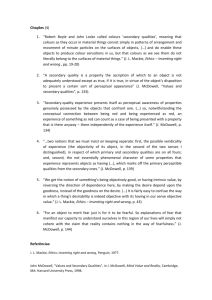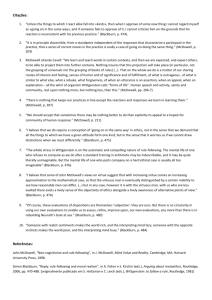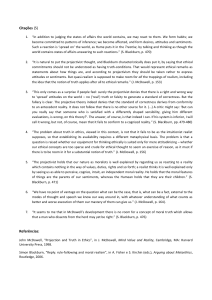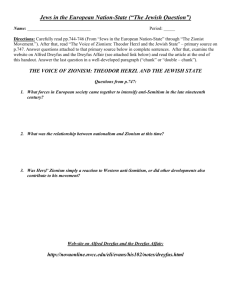自我、行動與被動性
advertisement
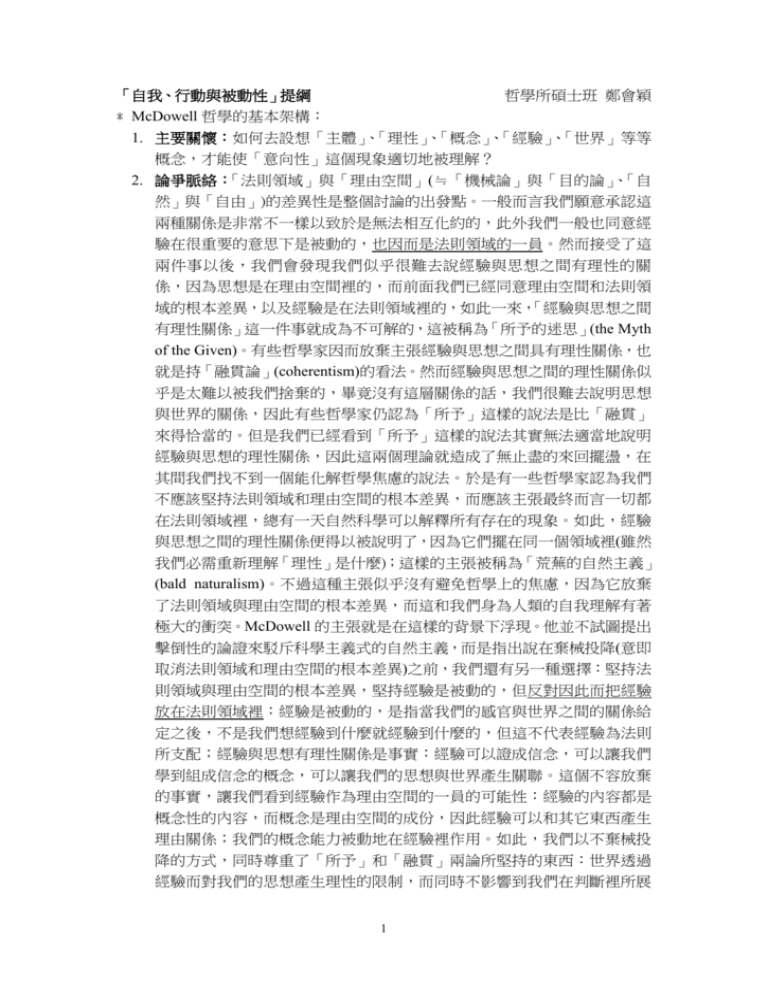
「自我、行動與被動性」提綱 哲學所碩士班 鄭會穎 ﹡McDowell 哲學的基本架構: 1. 主要關懷:如何去設想「主體」、「理性」、「概念」、「經驗」、「世界」等等 概念,才能使「意向性」這個現象適切地被理解? 2. 論爭脈絡:「法則領域」與「理由空間」(≒「機械論」與「目的論」、「自 然」與「自由」)的差異性是整個討論的出發點。一般而言我們願意承認這 兩種關係是非常不一樣以致於是無法相互化約的,此外我們一般也同意經 驗在很重要的意思下是被動的,也因而是法則領域的一員。然而接受了這 兩件事以後,我們會發現我們似乎很難去說經驗與思想之間有理性的關 係,因為思想是在理由空間裡的,而前面我們已經同意理由空間和法則領 域的根本差異,以及經驗是在法則領域裡的,如此一來, 「經驗與思想之間 有理性關係」這一件事就成為不可解的,這被稱為「所予的迷思」(the Myth of the Given)。有些哲學家因而放棄主張經驗與思想之間具有理性關係,也 就是持「融貫論」(coherentism)的看法。然而經驗與思想之間的理性關係似 乎是太難以被我們捨棄的,畢竟沒有這層關係的話,我們很難去說明思想 與世界的關係,因此有些哲學家仍認為「所予」這樣的說法是比「融貫」 來得恰當的。但是我們已經看到「所予」這樣的說法其實無法適當地說明 經驗與思想的理性關係,因此這兩個理論就造成了無止盡的來回擺盪,在 其間我們找不到一個能化解哲學焦慮的說法。於是有一些哲學家認為我們 不應該堅持法則領域和理由空間的根本差異,而應該主張最終而言一切都 在法則領域裡,總有一天自然科學可以解釋所有存在的現象。如此,經驗 與思想之間的理性關係便得以被說明了,因為它們擺在同一個領域裡(雖然 我們必需重新理解「理性」是什麼);這樣的主張被稱為「荒蕪的自然主義」 (bald naturalism)。不過這種主張似乎沒有避免哲學上的焦慮,因為它放棄 了法則領域與理由空間的根本差異,而這和我們身為人類的自我理解有著 極大的衝突。McDowell 的主張就是在這樣的背景下浮現。他並不試圖提出 擊倒性的論證來駁斥科學主義式的自然主義,而是指出說在棄械投降(意即 取消法則領域和理由空間的根本差異)之前,我們還有另一種選擇:堅持法 則領域與理由空間的根本差異,堅持經驗是被動的,但反對因此而把經驗 放在法則領域裡:經驗是被動的,是指當我們的感官與世界之間的關係給 定之後,不是我們想經驗到什麼就經驗到什麼的,但這不代表經驗為法則 所支配;經驗與思想有理性關係是事實:經驗可以證成信念,可以讓我們 學到組成信念的概念,可以讓我們的思想與世界產生關聯。這個不容放棄 的事實,讓我們看到經驗作為理由空間的一員的可能性:經驗的內容都是 概念性的內容,而概念是理由空間的成份,因此經驗可以和其它東西產生 理由關係;我們的概念能力被動地在經驗裡作用。如此,我們以不棄械投 降的方式,同時尊重了「所予」和「融貫」兩論所堅持的東西:世界透過 經驗而對我們的思想產生理性的限制,而同時不影響到我們在判斷裡所展 1 現的自由。 ﹡與 Dreyfus 的爭論: 1. 背景:Dreyfus 在為其學生 Samuel Todes 的著作 Body and World 寫的導言 裡,提及他對 McDowell 看法的反對;他並沒有對以上所刻劃的論爭脈絡 提出具體的批評,而只是對 McDowell 最後得出的結論–「經驗的所有內 容都是概念性的內容」–表達反對。後來 McDowell 將探討的範圍擴展到 「行動」時,Dreyfus 才具體地對相關的說法進行批評。他們的文章交鋒順 序大致如下: McDowell: Mind and World (1996) ‘Conceptual Capacities in Perception’ (2005) Dreyfus: ‘Overcoming the Myth of the Mental’ (2005) McDowell: ‘What Myth?’ (2007a) Dreyfus: ‘The Return of the Myth of the Mental’ (2007a) McDowell: ‘Response to Dreyfus’ (2007b) Dreyfus: ‘Response to McDowell’ (2007b) 以下我將試圖以自己的方式為 McDowell 辯護。在這場爭論中,McDowell 的立場是不變的,而 Dreyfus 卻多次調整自己的說法,因此以下我會大致 依時間順序來討論 Dreyfus 的主張,並試圖指出其中的錯誤並未隨著他的 調整而消除;而了解並放棄那個錯誤想法後,我們就可以發現其實現象學 的討論是可以對 McDowell 的立場有正面的影響的。 2. 具體爭論:在行動這裡,McDowell 主張行動所涉及的身體動作都是概念能 力的展現。這是為了說明「行動」(與「行為」對比)是可被歸諸於理性行 動者(rational agency)的。McDowell 舉例道,如果一個跑者在跑步的過程中 以幾近無意識的方式看到了一個往右指的箭頭標示,然後便遵循這個指示 往右轉;事後問他的時候,或許他可以給出正確的理由: 「因為我遵循了那 個標示」 。當然,不可否認地有時候這樣的答案是過度合理化的,或有時當 事者根本給不出答案,但重點在於, 「有時候」行動者能夠給出正確的答案, 而如果行動裡有些部分完全是與概念無關的,便無法解釋為什麼這個行動 可以被歸給一個理性行動者。Dreyfus 反對這個結論;他舉出一些有趣的例 子,並做出一些區分來詮釋這些例子,然後試圖指出 McDowell 的立場無 法說明那些狀況。讓我們先來看看 Dreyfus 做了什麼樣的區分。 在‘Overcoming the Myth of the Mental’裡,Dreyfus 做的區分是「抽離 的規則依循」(detached rule-following)與「依憑於特定場合的應對方式」 (situation-specific way of coping)。McDowell 在‘What Myth?’裡指出,在他 討論亞里斯多德的‘Phronesis’概念時,明確主張他認為概念不是抽離的存 在;我們與概念之間的關係不是抽離的依循關係。Dreyfus 在其回應‘The Return of the Myth of the Mental’的開頭承認了他的疏忽,但令人驚訝的 2 是,在大約十頁以後,他再度提及了類似的區分:「抽離的概念意向性」 (detached conceptual intentionality)和「投入的動覺意向性」(involved motor intentionality)。再次把「概念」和「抽離」放在一起是令人疑惑的,因為 討論的雙方在之前都同意這不是他們所主張的。由此,我認為在這個階段 Dreyfus 還沒有真正放棄原先的區分。到了下一次回應,‘Response to McDowell’,他似乎意識到立基於這個區分的批評不成功,因此以一個新 的區分來取代它;這個新的區分是「主體性」(subjectivity)與「忘我」 (absorption)。他現在主張在行動中,特別是熟練的行動時, 「主體」或「行 動者」是完全不涉入的。此外,在了解到 McDowell 可以說明「投入」的 狀況後,Dreyfus 指出當我們投入到極致的狀況時,會進入「忘我」的狀態; 在這種狀態下,自我完全消失,因而不會有概念的作用。這便是 Dreyfus 目前為止最穩定的討論框架。 在這樣的框架之下,Dreyfus 舉出他所認為的反例。他最倚重的一個例 子是前洋基隊的二壘手 Chuck Knoblauch。他曾經是一位技巧非常好的選 手,但從某天他突然開始思考如何接球、如何傳球,於是他的技巧不再, 甚至連正常的傳球也不易做到。當偶而狀況緊急讓他來不及思考時,他可 以做到以往的好守備,但只要是讓他有時間思考的狀況,他就沒辦法正常 守備了。Dreyfus 認為這是主體性干擾忘我行動的一個證據。 首先我們可以注意,Dreyfus 試圖用這個例子來對比 McDowell 的跑者 例子:在兩個例子裡, 「行動者」都把自己相對抽離原來的狀況來進行反思, 而 Dreyfus 認為從他舉的例子可以看出,McDowell 的看法無法說明如此現 象。但這樣子的對比是不恰當的:在跑者的例子裡,他是「事後」去反思 某個行動的「理由」 ,而 Knoblauch 卻是在行動的「當下」去反思某個行動 的「實行機制」 ;不論是反思的時間和對象,兩個例子都沒有相對應,因此 Dreyfus 的例子似乎是無關的。 或許他可以退一步說,他並不意圖用他的例子來對比 McDowell 的例 子,而是主張就 Knoblauch 的例子本身就足以看出 McDowell 的立場有問 題:Knoblauch 的例子似乎顯示出,只要主體、理性、概念一涉入,原本 流暢的行動便被破壞了,這表示 McDowell 的主張–「行動所涉及的身體 動作都是概念能力的展現」–是錯誤的。Dreyfus 認為在這樣的行動中,我 們就像人類以外的動物,不使用理性、概念,但反而可以做出異常流暢的 行動來,而這是 McDowell 所忽略的現象。 注意 Dreyfus 如何去理解「理性」與「概念」 。對他而言,它們(或許還 有主體性)和「注意力」 、 「反思」 、以及「熟慮」(deliberation)是綁在一起的: 在 Knoblauch 的例子裡,當他開始去注意、反省自己的行動時,他就已經 喪失了原本的技巧了,因此我們的確可以說,注意或者反思是(至少某些) 行動的敵人。但有什麼理由認為這是對 McDowell 立場的反例呢?我認為 不論是就詮釋還是就本身的合理性而言,都十分值得商榷。以詮釋來說, 3 McDowell 從未把這些概念放在一起;就本身的合理性來說,這樣的觀點是 過於荒謬而不值得批駁的:真的有人能合理地主張,我們在知覺與行動裡, 都不斷地去「注意」、「反思」自己在看什麼、做什麼嗎?如果 Dreyfus 的 對手真的這麼主張,那麼它根本不會是值得對話的立場了。然而 Dreyfus 自始自終都以這樣的方式來理解 McDowell。Dreyfus 指出,忘我是投入的 極端狀況,但同樣地,他應該要了解道反思是概念或理性活動的極致,而 非全部。當我們說某事涉及概念活動時,不表示我們總是在注意它:對話 是一種概念的運用,但我們並不總是注意我們在說什麼。當 McDowell 主 張行動所涉及的肢體活動是概念能力的展現時,他基於的是先驗的理由– 「其中運作的概念能力使得事後的反思成為可能」–而 Dreyfus 並沒有對 這一點提出任何批評。 Dreyfus 本身立場的一個問題是,「專家的技能」與「反射動作」似乎 變得不可區分。一般而言,我們仍認為專家的所謂「忘我」行動就一個意 思上是「他們」的行動,雖然並不是「他們」很有意識地主動去決定要怎 麼做;誠如 Dreyfus 所說,當主動去影響時,技巧就喪失了。然而我們仍 認為這樣的行動和反射動作有所不同,因為後者和主體性是全然無關的; 當我說「我的」膝反射時,其實指的是「我身體的某處」反射,這和專家 的行動截然不同。如果不是這樣,那棋王也不值得敬佩了,因為厲害的不 是他,而是他的身體。 到目前為止,我認為 Dreyfus 所提出的看法只能被合理地視為是對 McDowell 的建議或提醒,而非批評; 他的理由及例子並未顯示出有 McDowell 無法說明的部分。此外他自己的立場會遭遇到一些很難回答的問 題,比如為什麼把「概念」、「理性」這樣的事情和「反思」等同起來,以 及如何去區分專家的技能和純然的反射動作。雖然我認為 Dreyfus 這一系 列的批評並不成功但這不表示他對相關討論是沒有貢獻的。McDowell 與 Dreyfus 所代表的兩個哲學傳統的對話才剛開始,我希望在此所做的區辨能 為整個討論帶來正面的影響。 4 Self, Action, and Passivity 鄭會穎 政治大學哲學所碩士班 cognitivism@yahoo.com.tw ‘We find ourselves always already engaging with the world…’ – John McDowell, Mind and World, Lecture II1 Ⅰ. Understanding Passivity The notion of ‘passivity’ does not often figure in philosophical discussions explicitly, but it is indeed central to many issues in philosophy. Thanks to the success of modern sciences, many of us have regarded nature as disenchanted. There are countless events in this disenchanted nature, and they are in a significant sense passive: given certain natural laws and certain initial conditions, certain events follow. There is no ‘elbow room,’ to use a metaphor made popular in relevant issues by Daniel Dennett.2 There is still a long way for sciences to go, to be sure, but many of us agree on this scientific outlook generally. Puzzles arise when we consider our capacities as human subjects. We perceive, think, act, and feel. None of them, however, seems to sit well with the scientific outlook.3 We are subjects, and what makes us subjects is something active: we are not like stones and lower animals in the sense that we can actively perceive, think, act, and (at least in some derivative sense) feel.4 It is difficult to see how the active aspects, no matter how we understand them, can fit into the scientific outlook in general. For those who don’t want to give up the very idea of ‘subjectivity,’ nevertheless, it is necessary to reconcile the active and the passive elements. On the face of it, activity and passivity are outright incompatible with each other, so to The present paper evolves from ‘Towards a Conceptualist Account of Action,’ my term paper of ‘McDowell and Merleau-Ponty,’ a seminar led by Professor Hubert Dreyfus and Hannah Ginsborg in UC Berkeley, fall 2006. I am indebted to both of them very much. I also gained various helpful comments from Professor Alva Noë, who also presented in the seminar. Professor Dreyfus, my main opponent in that paper, casts doubt on the notion of ‘we’ in my opening quotation here: ‘who is the ‘we’ for McDowell? A subject? A Kantian ‘I think’?’ This query reminds me about the relation between action and self. At that time I couldn’t come up with a satisfying response to Professor Dreyfus; the present paper is supposed to be a further and fuller answer to his challenge. An earlier version of this, which was dubbed ‘Self in Action,’ was presented at 2007 Taiwan Philosophical Association. 2 See his Elbow Room: The Varieties of Free Will Worth Wanting (1984). 3 Some might think that the case of ‘feel’ is an exception, for it looks passive for many philosophers. I do not have strong opinions here, but if we regard it as integrated into subjectivity at large, it should be clear that it is not totally passive after all. I shall leave this at other occasions. 4 Things become very complicated and fuzzy when it comes to lower animals. For one thing, this notion covers too many species; for another, many people think that lower animals can actively perceive, act, and feel (maybe not think). This will be part of the main theme of the present paper. 1 5 re-understand both of them appears to be necessary for the reconciliation. In this paper I embark on this task by considering a series of recent exchanges between Hubert Dreyfus and John McDowell. Let me introduce some background of the debate first. Over some decades McDowell has developed a highly systematic account of intentionality and justification, and the account involves miscellaneous elements of our philosophy traditions.5 For my purpose, I shall simplify his central claim as follows: conceptual capacities are inextricably involved in our perceptual experiences. We can rephrase it by saying that it is Kantian spontaneity, i.e. conceptual capacities, that are responsible for both intentionality and justification. This is not an uncontroversial point: in both intentionality and justification, many philosophers think that there are certain non-conceptual elements in play. On the one hand, because it seems (at least for some) that there needs to be an unshakable foundation of empirical knowledge, the foundation itself, perceptual experience, must be non-conceptual, for to be conceptual is to be contaminated by human thoughts.6 On the other hand, because perceptual experience is about the world, it seems that the world must in some sense provide materials for perception. So, the thought goes, there must be something extra-conceptual to be divided up by our conceptual grids. These are just two examples of the various motivations of the views objected by McDowell.7 One would probably expect that conceptualism could be naturally extended to the case of action. Action also mediates mind and world, though with opposite directions. To phrase this in John Searle’s term, they have different ‘directions of fit.8’ And this expectation is confirmed by McDowell’s own remarks in LectureⅤof Mind and World.9 He sketches his view on action by saying that ‘intentions without overt activity are idle, and movements of limbs without concepts are mere happenings, not expressions of agency’ (Mind and World, p.89). On the face of it, McDowell attempts to offer a parallel account for action, though he does not complete the project in the lectures. Perception reflects the world, action changes the world; perception sustains beliefs, action carries out intentions. To conceive a parallel story is not so 5 By this I am not saying that McDowell engages constructive philosophy. But we should not deny that his diagnoses of philosophical anxiety are systematic, in the sense that they are constituted by delicate connections between many different elements, from Aristotelian second nature to Fregean sense, for example. 6 Another motivation is the fact that we seem to share basic perceptual capacities with animals and human infants. I will come back to this presently. 7 I do not back up these sketchy descriptions with McDowell’s huge previous works for I do not want to distract my readers. In debating with Dreyfus, McDowell offers his own summary for relevant aspects of his philosophy, which will be quoted later. 8 See his Intentionality: An Essay in the Philosophy of Mind (1983). 9 Alva Noë expresses his skepticism about this. He thinks after all, experience and action are quite different episodes. I agree that this expectation is not universal, but that doesn’t affect my following discussions. 6 unreasonable, at least at an intuitive level. Therefore, some philosophers start to envisage what McDowell would say, or should say, about action, Jonathan Dancy for example. 10 Some other philosophers go even farther to criticize the envisaged McDowellian account of action; Hubert Dreyfus is one among them. Even before entering the details of the debate between them, one may already feel something really intriguing about the discussions: traditions confront to other traditions; Hegel versus Merleau-Ponty, to paint with broad strokes. McDowell invokes a range of philosophical traditions to back up his position: Aristotle, Kant, Hegel, Wittgenstein, and Gadamer, to name a few. A striking feature of this group is that phenomenologists are absent: Husserl, Heidegger, and Merleau-Ponty are not in the list. Dreyfus suggests that McDowell’s position is defective exactly in this respect.11 I suggest that the notion of ‘passivity’ is the crux of their disagreements. To anticipate a bit, Dreyfus thinks that our bodies’ capacities to cope with the world are purely passive, but McDowell denies this. For McDowell, our bodies are rational animals’ bodies, and this implies that even our embodied copings with the world are permeated with rationality, that is, not purely passive. These two philosophers’ radically different conceptions of ‘passivity’ affect their overall pictures significantly. Ⅱ. Mindedness and Embodied Coping Let me begin by a quotation of McDowell’s summary of his own thoughts relevant to the present discussion: I have urged that our perceptual relation to the world is conceptual all the way out to the world’s impacts on our receptive capacities. The idea of the conceptual that I mean to be invoking is to be understood in close connection with the idea of rationality, in the sense that is in play in the traditional separation of mature human beings, as rational animals, from the rest of the animal kingdom. Conceptual capacities are capacities that belong to their subject’s rationality. So another way of putting my claim is to say that our perceptual experience is permeated with rationality. I have also suggested, in passing, that something parallel should be said about our agency. (‘What Myth?’ p.338-9) We will see that McDowell and Dreyfus have very different notions of the main concepts appeared in this passage, such as ‘perception,’ ‘concept,’ ‘receptive capacities,’ ‘rationality,’ ‘animals,’ and ‘agency.’ These discrepancies prevent effective See Dancy (2006) and McDowell’s reply to it in the same anthology. I will include the full bibliography at the end of the article. 11 Husserl is an exception. Dreyfus is also hostile to Husserl’s thoughts, so he regards his objections to McDowell as both Heideggerian and Merleau-Pontyan. 10 7 communications between them. My main objective here is to provide a better stage for further discussions.12 The story begins like this. Dreyfus briefly took issue with McDowell in his editor introduction to Samuel Todes’s Body and World. He writes: Neither Davidson nor McDowell tries to describe perceptual objects as they are in themselves and how they become the objects of thought. By calling attention to the structure of nonconceptual, practical perception and showing how its judgments can be transformed into the judgments of detached thought, Todes is able to provide a framework in which to explain how the content of perception, while not itself conceptual, can provide the basis for conception. Thus, Todes’s Body and World can be read as a significant anticipatory response to McDowell’s Mind and World. (Body and World, p.xvi, my italics) Here Dreyfus separates perception from conception; he thinks that there is something called ‘perception as they are in themselves, independent of conception.’ This seems to beg the question against McDowell, but Dreyfus is unblamable at this point, for what he did there is to introduce Todes’s seminal work, situating it into certain philosophical contexts by contrasting it with McDowell’s thoughts. No one has the responsibility to provide arguments at this kind of occasion. A few words about my strategy. The debates between McDowell and Dreyfus appear like continuous conversations: Dreyfus’s Presidential Address was responding to McDowell’s earlier works, and later in Inquiry they respond to each other for twice. Besides, Dreyfus does not reach his stable framework until the final response. Therefore, it would be onerous and ineffective for us to go through the discussions with the original sequence. Hence I shall offer a two-stage presentation of Dreyfus’s objections. First it’s general structure, and then its details. This means that sometimes I will fit Dreyfus’s earlier points and examples into his later, stable framework. The motivation is to present Dreyfus at his best. In what follows I will discuss how Dreyfus reaches his stable framework first. Dreyfus seriously argues against McDowell in his 2005 APA Presidential Address. He starts his argumentation by posing this question: ‘[c]an we accept McDowell’s Sellarsian claim that perception is “all the way out,” thereby denying the more basic perceptual capacities we seem to share with prelinguistic infants and 12 McDowell himself, in his replies to Dreyfus, has attempted to clarify his relevant notions, and Dreyfus concedes that he misunderstood McDowell at some points. But his concessions are piecemeal, and there are still some significant misunderstandings lurking in Dreyfus’s final response. What I will do here is to correct the misunderstandings in a systematic way, and through this I hope the lurking misunderstandings would thereby be dislodged. 8 higher animal’ (‘Overcoming the Myth of the Mental,’ p.1)? The positive statement of the position goes like this: ‘in assuming that all intelligibility, even perception and skillful coping, must be, at least implicitly, conceptual…Sellars and McDowell join Kant in endorsing what we might call the Myth of the Mental’ (ibid., p.7, italics arranged by me). In supporting this claim, he brings in a distinction that is crucial to his argumentations: The actual phenomenon [i.e. expertise] suggests that to become experts we must switch from detached rule-following to a more involved and situation specific way of coping…Such emotional involvement seems to be necessary to facilitate the switchover from detached, analytical rule following to an entirely different engaged, holistic mode of experience… (ibid, p.7-8, my italics) Dreyfus uses some other distinctions to supplement this one, including detached theoretical perspective / engaged situation in the world (ibid., p.3), calculate / involve (ibid., p.15), and knowing-that / knowing-how (ibid., p.17). I shall focus on the one appeared in the quotation. Dreyfus assumes that McDowell regards actions as detached rule-following, but he never tells us why he thinks that. Moreover, we have positive reasons to think otherwise. In his critique of Saul Kripke’s reading of Wittgenstein, McDowell painstakingly disabuses this detached conception of rule-following. For example, he writes: [Kripke’s] line if interpretation gets off on the wrong foot, when it credits Wittgenstein with acceptance of a ‘skeptical paradox’… the reasoning that would lead to this ‘skeptical paradox’ starts with something Wittgenstein aims to show up as a mistake: the assumption, in this case, that the understanding on which I act when I obey an order must be an interpretation (‘Wittgenstein on Following a Rule,’ p.236). Kripke conceives understanding as a species of interpretation, so whenever I use the ‘plus’ function, I can interpret my past usages of it so as to conform other deviant functions, hence the paradox. McDowell urges that the source of the paradox is the detached conception of rule-following: we need to do interpretation when our understanding is functioning. The problematic picture is that there are some freestanding mental items that have no normative relations with the external world, so we need interpretations to build up these relations. It is this detached picture, McDowell submits, that generates the skeptical paradox. He further connects his critique to Wittgenstein’s notions of ‘practice,’ ‘custom,’ and ‘form of life.’ It is not clear, at least for me, why Dreyfus does not regard McDowell as an ally at least in this 9 respect. After the passage I just quoted from McDowell, he immediately considers the signpost example; this further confirms the relation between the rule-following consideration and the present discussions.13 The distinction between detached rule-following and involved skillful coping seems to be dubious. Alva Noë adumbrates this line of thought succinctly: …Kelly and Dreyfus lay out their position against a background assumption that normal perceptual experience is detached and representational; it has description-like representational contents and specifies conditions of satisfaction, as Kelly’s other teacher Searle has proposed. They then argue that there is a special mode of engaged experience. (‘Novel Experience,’ p.16) But this is precisely McDowell disagrees with when he writes that ‘[w]e find ourselves always already engaging with the world’ (Mind and World, p.34, my italics). Dreyfus admits this understanding in his reply, ‘The Return of the Myth of the Mental’: ‘I did assume, accepting the traditional understanding, that McDowell understood rationality and conceptuality as general. I should have known better. I’m sorry that I attributed to McDowell the view of rationality he explicitly rejects in his papers on Aristotle’ (‘The Return of the Myth of the Mental,’ p.353, my italics).14 Unfortunately, Dreyfus lapses again, ten pages later, when he contrasts ‘detached conceptual intentionality’ with ‘involved motor intentionality’ (ibid., p.363, and notice my italics in the passage I just quoted). I am puzzled by this: Dreyfus first claims, rightly, that he and McDowell agree that conceptuality is situation-dependent; that is, not general or detached. But after that he, in the very same paper, describes conceptual intentionality as detached. I don’t know how to make of this. In his rejoinder, McDowell observes: Dreyfus acknowledges that he was wrong to think practical intelligence, as I conceive it, is situation-independent. But he still thinks my view of mindedness can be characterized in terms of ‘detached conceptual intentionality.’ (‘Response to Dreyfus,’ p.366) 13 McDowell develops his critique of Kripke in his 1984 and 1993 papers. I discuss and defend McDowell’s thoughts on rule following in ‘An Initial Defense of Semantic Primitivism’ (unpublished). I say more about the skeptical paradox as such in ‘The Skeptical Paradox and the Nature of Self’ (unpublished). 14 Dreyfus mentions Aristotle because he and McDowell conduct the discussion by focusing on Aristotle’s notion of ‘Phronesis.’ Since they have reached agreement at this point, I shall not talk more about it here. I relate the discussion to Kripke and Wittgenstein instead, for the connection is relevant but missed in their exchanges. 10 McDowell writes as if Dreyfus only admits that practical intelligence is situation-dependent in McDowell’s sense, but actually he confesses that he should not understand McDowell’s notions of ‘rationality’ and ‘conceptuality’ as situation-independent. Therefore, I cannot see any decisive progress in Dreyfus’s first reply. Of course I am not saying that there is no progress here, but Dreyfus still preserves the general structure from his Presidential Address. It can be dubbed the ‘detachment / involvement’ distinction. Dreyfus replaces this structure with a new one in his second reply. Now the crucial distinction is constituted by ‘subjectivity’ and ‘absorption’: [There is] a deep issue dividing us – an issue that is obscured by my failure to distinguish explicitly absorption and involvement. I should have argued that subjectivity (not detachment) is the lingering ghost of the mental… (‘Response to McDowell,’ p.373, my italics) In this final response, Dreyfus realizes that it is inappropriate to saddle McDowell with the notion of ‘detachment,’ and he proposes that it is ‘subjectivity,’ which he means the operation of ‘subject’ or ‘agent,’ that is at fault. Besides, realizing that McDowell can accommodate the phenomena of ‘involvement,’ Dreyfus submits that it is ‘absorption,’ that is, ‘involved coping at its best’ (ibid., p.373, my italics), that shows the falsity of conceptualism. 15 This completes my characterization of Dreyfus’s stable framework. Now I turn to the details of his objections. The final version of the general framework is the ‘subjectivity / absorption’ distinction. By ‘subjectivity’ Dreyfus means ‘agency,’ which is ‘the lingering ghost of the mental’ (ibid., p.373) according to him. As to ‘absorption,’ he writes that ‘[i]n fully absorbed coping, there is no immersed ego, not even an implicit one’ (ibid., p.374, my italics). He further adds that ‘in attentive, deliberate…action an ego is always involved’ (ibid., p.374, my italics). Notice that before Dreyfus reaches this final version, the notion of ‘attention’ and the like has occupied a central place in his objections, including his favorite example from Chuck Knoblauch: As second baseman for the New York Yankees, Knoblauch was so successful he was voted best infielder of the year, but one day, rather than simply fielding a hit and throwing the ball to first base, it seems he stepped back and took up a ‘free, distanced orientation’ towards the ball and how he was throwing it – to the mechanics of it, as he put it. After that, he couldn’t recover his former absorption and 15 This remark suggests that what Dreyfus is describing here is a distinction, not a dichotomy: the differences between attentive, involved, and absorbed actions are a matter of degree. This will become important latter in my discussion. 11 often – though not always – threw the ball to first base erratically – once into the face of a spectator. Interestingly, even after he seemed unable to resist stepping back and being mindful, Knoblauch could still play brilliant baseball in difficult situations – catching a hard-hit ground ball and throwing it to first faster than thought. What he couldn’t do was field an easy routine grounder directly to second base, because that gave him time to think before throwing to first. (‘The Return of the Myth of the Mental,’ p.354) The notion of ‘attention’ and the like play a heavy role in Dreyfus’s objections through out the whole debate. Here are more examples: [We] are only part-time rational animals. We can, when necessary, step back and put ourselves into a free-distanced relation to the world. We can also monitor our activity while performing it…But monitoring what we are doing as we are doing it…leads to performance which is at best competent. (‘The Return of the Myth of the Mental,’ p. 354-5, my italics) [E]xpert coping…[is] direct and unreflective, which I take to be the same as being nonconceptual and nonminded. (ibid., p.355, my italics) [W]e should be careful not to take the crucial importance of attention and rational reflection in our lives as an argument that we are animal whose essential feature is our capacity to be mindful. (ibid., p.363, my italics) [McDowell and I] presumably agree that, when one is involved in learning, problem solving, responding to coaching etc., one acts with deliberation and so one experiences oneself as a subject monitoring one’s involved activity – that is, one is mindful of what one is doing. (‘Response to McDowell,’ p.373, my italics) This line of argumentation, nevertheless, is both ungrounded as a position and uncharitable as an interpretation. Consider the passage McDowell first invokes the notion of ‘stepping back’: Consider someone following a marked trail, who at a crossing of paths goes to the right in response to a signpost pointing that way. It would be absurd to say that for going to the right to be a rational response to the signpost, it must issue from the subject’s making an explicit determination that the way the signpost points gives her 12 a reason for going to the right. What matters is just that she acts as she does because (this is a reason-introducing ‘because’) the signpost points to the right. (This explanation competes with, for instance, supposing she goes to the right at random, without noticing the signpost, or noticing it but not understanding it.) What shows that she goes to the right in rational response to the way the signpost points might be just that she can afterwards answer the question why she went to the right - a request for her reason for doing that - by saying ‘There was a signpost pointing to the right.’ She need not have adverted to that reason and decided on that basis to go to the right. (‘Conceptual Capacities in Perception,’ p.3, my italics) First of all, notice that the subject in this scenario steps back and reflects on her reason for the action retrospectively, as opposed to Dreyfus’s subject who steps back and reflects on his mechanics of the action when he is carrying out the action. So the fact that the stepping-back screws up the expertise is simply irrelevant. Secondly, it is clear that ‘mindedness’ never means ‘attention’ in McDowell’s writings16: it would be insane to hold that our perceptual experiences (and actions) are attentive all the way out; if that were the claim, then Mind and World would be easily refuted. Dreyfus’s reading of McDowell strikes me as uncharitable. Dreyfus reminds us that absorbed coping is involved coping at its best. He should have acknowledged that, by similar considerations, attention, deliberation, and monitoring are mindedness at its best. This means that mindedness is not exhausted by attention and the like. To claim otherwise, Dreyfus needs to establish that attention is the mark of the mental. I see every reason to oppose to this proposition. McDowell never claims that there is an immersed or implicit self in actions, if we understand self with attention and the like. Self does accompany intentional actions in a weaker sense that actions are within the realm of the conceptual or the rational. But Dreyfus disagrees. He urges that cases like chess Grandmaster show that absorbed coping is in no sense rational (‘Response to McDowell,’ p.374). I suggest we compare that case with cases like alien hand or reflexive behaviors. Dreyfus is not willing to identify absorbed coping with mere reflexive behaviors17, so presumably it still has to do our agency. Dreyfus is hostile to this idea, for he persistently confines mindedness to the realm of the attentive. But as I just said, McDowell never claims that, and the claim itself is simply wrong: when you are not paying attention to one of your beliefs, that doesn’t disqualify that belief’s status as a mental state. To concentrate on the notion of ‘attention’ is a red herring of the whole discussion. And McDowell never uses the notion of ‘mindful.’ Although ‘mindful’ and ‘minded’ are almost interchangeable according to many dictionaries, ‘minded’ is supposed to capture the passivity of the mind. Dreyfus cannot see this delicacy because he always identifies mind with attention or reflection. 17 He mentions Homer at this point (‘Response to McDowell,’ p.374). 16 13 In identifying mindedness with the attentive, Dreyfus cannot make sense of McDowell’s proposal: This pervasiveness claim, however, seems to be based on a category mistake. Capacities are exercised on occasion, but that does not allow one to conclude that, even when they are not exercised, they are, nonetheless, ‘operative’ and thus pervade all our activities. (ibid., p.372) We are not allowed to make that conclusion, according to Dreyfus, for to claim that conceptuality is operative involves a category mistake. But that is not so. To say that conceptuality or mindedness is operative is to insist that conceptual capacities can be activated passively. This may sound strange for Dreyfus or some others, but they need to tell us why that’s incoherent or at least problematic. McDowell offers reasons for this claim is his Locke Lectures, but here is not the place to discuss them. Dreyfus also quotes Sartre, with the misidentification between the conceptual with the attentive: When I run after a streetcar, when I look at the time, when I am absorbed in contemplating a portrait, there is no I…I am then plunged into the world of attractive and repellant qualities – but me, I have disappeared. (The Transcendence of the Ego, p.48-9) But this does not support Dreyfus’s claim. All this shows is that in doing these kinds of things, we are often not monitoring them. It doesn’t follow, however, that our minds are gone. Those actions are simply different from reflexive behaviors that even vegetables are capable of. Dreyfus acknowledges that ‘mindedness’ is a technical term on McDowell part (ibid., p.374), but he doesn’t really respect this point: he opens his response to McDowell by classifying ‘conceptuality’ and ‘mindedness’ as mentalist notions (ibid., p.371). ‘Mentalism’ is a very vague term, to be sure, but to my knowledge none of its meanings fits McDowell’s usage. If McDowell uses ‘conceptuality’ mentalistically, how can he manage to answer the charge that his position is idealistic in Berkeley’s sense? Dreyfus would presumably press this question: ‘if mindedness is not identical to a monitoring self, then what is it?’ To this McDowell has an answer: It is a matter of an ‘I do’…Conceiving action in terms of the ‘I do’ is a way of registering the essential first-person character of the realization of practical rational 14 capacities that acting is. (‘Response to Dreyfus,’ p.367, my italics) Dreyfus objects to this, but again on the false assumption that this first-person character is in the realm of the attentive (‘Response to McDowell,’ p.375). What McDowell does mean, however, is that our absorbed coping, involved coping at its best, is not like cases such as alien hands. By contrast, in repudiating this first-person character, it is not clear how Dreyfus can leave room for the crucial distinction between absorbed coping and mere reflexive behaviors. Dreyfus sets a dilemma between ‘a meaninglessly bodily movement’ and ‘an action done by a subject for a reason’ to McDowell (ibid., p.374). McDowell would escape this dilemma by insisting that (intentional) bodily movements are meaningful. Dreyfus would agree on this point, but it should be clear that this ‘motor intentionality’ can be appropriately understood only by those who respect the distinction between absorbed coping and mere reflexive behaviors. About this ownership consideration, Dreyfus says: Of course, the coping going on is mine in the sense that the coping can be interrupted at any moment by a transformation that results in an experience of stepping back from the flow of current coping. I then retrospectively attach an ‘I think’ to the coping and take responsibility for my actions. (‘The Return of the Myth of the Mental,’ p. 356, Dreyfus’s italics)18 McDowell’s explanation of this is the pervasiveness claim, but Dreyfus’s is not convinced. His alternative explanation is, surprisingly enough, purely physiological (‘Response to McDowell,’ p.374). But this is problematic. For one thing, this physiological claim is compatible with all camps in this debate; for another, if it is the whole story for Dreyfus, then how can the notion of ‘responsibility’ mentioned in the quotation above be explained? Later Dreyfus seems to radicalize his answer. In describing McDowell’s view he disagrees with; he writes that: ‘to the question “who act?” [McDowell] responds: “the answer is ‘I do’”’ (‘Response to McDowell,’ p.373). But if this is an answer Dreyfus objects to, he seems to have no alternative but commit that the answer is ‘this body does.’ That’s why McDowell argues that ‘[t]he real myth in this neighborhood is…the Myth of the Disembodied Intellect’ (‘What Myth?’ p.349). Dreyfus replies that this Myth is more like Gadamer’s and McDowell’s view, for ‘[i]t assumes that human beings are defined by their capacity to distance themselves from their involved 18 Here he recognizes that the stepping back at issue is retrospective, but he lapsed earlier in discussing Knoblauch’s case. 15 coping’ (‘The Return of the Myth of the Mental,’ p.355). This doesn’t seem right to me. Even if one holds this definition of human beings, it does not follow immediately that our mindedness is disembodied. Dreyfus rejects this because he mistakenly identifies mindedness with attention or deliberation. And McDowell attributes that Myth to Dreyfus because ‘[i]f you distinguish me from my body, and give my body that person-like character, you have too many person-like things in the picture…’ (‘Response to Dreyfus,’ p.369). That is to say, if both self and ‘this body’ are person-like things and the self is not this body, than it must be a disembodied person. Dreyfus does not address this objection at all. Now we are in the position to evaluate these two philosophers’ notions of ‘perception,’ ‘concept,’ ‘receptive capacities,’ ‘rationality,’ ‘animals,’ and ‘agency,’ as I promised at the outset of this section. As we have seen, in his introduction to Todes’s book Dreyfus presupposes that perception excludes concepts, and arguably that’s because he understands conceptuality as attention or monitoring. This understanding should be abandoned for both exegetic and philosophical reason, as I argued above. Moreover, Dreyfus understands receptive capacities as sheer passivity, and thinks to say that conceptual capacities are operative in receptivity commits one a category mistake. This is also ungrounded, for the ‘sheer passivity’ understanding cannot do justice to the significant differences between expertise and mere reflexive behaviors. Dreyfus also has a too narrow conception of rationality and agency. When we take a walk with our friends and talk to them inattentively, still it is ‘us’ who are walking and talking. Even we do not concentrate on our conversations, the contents of the utterances are still more or less rational. When you ask me why I said something few seconds ago, I might find that that very utterance was a bit irrational, but often that would not be entirely irrational (whatever that might mean) and even if it did, when we step back and deliberate, we can correct our inappropriate thoughts. The case of Knoblauch does not affect McDowell’s position, for he (and presumably most of us) does not identify conceptuality or mindedness as attention, monitoring, deliberation, or reflection. Finally, Dreyfus thinks our animal nature has no philosophically interesting differences from other animals. This is backed up by what McDowell identifies as the ‘quick argument’: from the premise that we share basic perceptual capacities and embodied coping skills to the conclusion that ‘those capacities and skills, as we have them, cannot be permeated with rationality, since other animals are not rational’ (‘What Myth,’ p.343). ‘But the quick argument does not work.’ McDowell continues, The claim that the capacities and skills are shared comes to no more that this: there are descriptions of things we can do that apply also to things other animals can 16 do…But the truth about a human being’s exercise of competence in making her around, in a performance that can be described like that, need not be exhausted by the match with what can be said about, say, a cat’s correspondingly describable response to a corresponding affordance. The human being’s response is, if you like, indistinguishable from the cat’s response qua response to an affordance describable in those terms. But it does not follow that the human being’s response cannot be unlike the cat’s response in being the human being’s rationality at work. (ibid., p.343, McDowell’s italics) This reflects a central thought of McDowell’s thinking: when two phenomena share something, we are not forced to regard this ‘something’ as a discrete thing, ‘a core’ shared by these two phenomena. ‘It is not compulsory,’ as he likes to put it. And he further argues that ‘if we do take this line, there is no satisfactory way to understand the role of the supposed core in our perceptual lives’ (Mind and World, p.64). Here ‘perceptual lives’ is of course just an example. This central thought is two-staged: first, the factorizing way is not compulsory, and second, it will lead to in principle irresolvable quandary. In the case of passivity, the devastating problem is the infamous Myth of the Given. Ⅲ. The Real Myth of the Given ‘The Myth of the Given’ was introduced and criticized by Wilfrid Sellars in his celebrated ‘Empiricism and the Philosophy of Mind.’ Many contemporary philosophers identify the myth with indubitability, but that’s not Sellars’s original formulation. 19 Now Dreyfus’s target is McDowell, not Sellars, so let’s turn to McDowell’s formulation of the dialectics. He first introduces the idea of the sui generis character of the space of reasons, compare with the realm of law. The former is in the ‘normative contexts,’ the latter is exhausted by the ‘empirical descriptions’: Sellars separates concepts that are intelligible only in terms of how they serve to place things in the logical space of reasons, such as the concept of knowledge, from concepts that can be employed in ‘empirical description’…whatever the relations are that constitute the logical space of nature [i.e., the realm of law], they are different in kind from the normative relations that constitutes the logical space of reasons. (Mind and World, p. xiv-xv) And if we place something in the realm of law, but demand it to do something only an 19 Willem deVries and Timm Triplett make an admirable effort to gloss this formidable piece. In page xxii and xxiii, they point out that Sellars did not identify the myth with incorrigibility (indubitability). 17 inhabitant of the space of reasons can do, than we commit something like the ‘naturalistic fallacy’: The idea of a tribunal belongs…in what Sellars calls ‘the logical space of reason…But the idea of experience, at least construed in terms of impressions, evidently belongs in a logical space of natural connections. That can easily make it seem that if we try to conceive experience as a tribunal, we must be falling into the naturalistic fallacy…(Mind and World, p.xvi) This is how McDowell identifies the Myth of the Given. Now Dreyfus thinks his picture by no means falls into this Myth: Given its structural similarity to empiricism, we need to make clear that existential phenomenology does not assume an indubitable Given on which to base empirical certainties. As with all forms of intentionality, solicitations can be misleading and in responding to such solicitations one can be misled. (‘The Return of the Myth of the Mental,’ p.362, my italics) Notice that Dreyfus distances himself from the Myth of the Given by stressing that the foundations in his picture are not indubitable, but this does not respond to the mystical part of the Given identified by McDowell. Notice that when McDowell diagnoses the oscillating seesaw in modern philosophy, he never mentions ‘foundationalism.’ Foundationalism, at least in its stronger form, often implies indubitability, but that’s not the problem McDowell is identifying. The McDowellian problematic is constituted by coherentism and the Myth of the Given, not foundationalism. The worse thing is that later Dreyfus says something exactly fall prey to the Myth of the Given: The world of solicitations, then, is not foundational in the sense that it is indubitable and grounds our empirical claims, but it is the self-sufficient, constant, and pervasive background that provides the base for our dependent, intermittent, activity of stepping back, subjecting our activity to rational scrutiny, and spelling out the objective world’s rational structure. (ibid., p. 363) It is not clear that what the ‘base-providing’ claim amounts to, but obviously Dreyfus thinks solicitations have to do with our rational structures. Now how does he characterize solicitations as such? In the figure that he invokes to contrast McDowell’s notion of ‘world’ with Merleau-Ponty’s, he writes that for 18 phenomenologists the world is ‘[s]olicitations to act; [a] web of attractions and repulsions’ (ibid., p.357). Later in contrasting with ‘affordance,’ he binds solicitations with the notion of ‘drawing’ (ibid., p.361). Now solicitations sound like something in the realm of law: in this realm there is no freedom; we are just drawn into these or those movements of limbs, or ‘expertise’ in Dreyfus sense. Freedom kicks in when we step back and reflect, so it does not belong to solicitations, in Dreyfus’s sense. Dreyfus says that solicitations ‘can be misled’ (p.362), and this makes Merleau-Pontyan world ‘normative’ (ibid., p.357). But solicitations in this sense are just attractions and repulsions constituted by relations between objects and our bodies, which subject to the realm of law, so ‘being misled’ can be only a metaphor. By contrast, McDowell’s world deserves to be called ‘normative,’ for he argues that the world is encompassed by the realm of the conceptual, and conceptual relations are normative connectedness. In this way, Dreyfus unwittingly commits a version of the Myth of the Given: solicitations are inhabitants in the realm of law, but they are supposed to ‘provide the base’ for the space of reasons: ‘[t]hese solicitations have a systematic order that…works in the background to make rationality possible’ (ibid., p.358, my italics). Given that Dreyfus is not a bald naturalist, who are willing to bite the bullet of reducing the space of reasons to the realm of law, his picture is ultimately fall prey to the Myth of the Given. I find Dreyfus’s notion of the body peculiar. On the one hand, he attributes the body person-like characters; on the other, the body responds to only solicitations conceived as inhabitants in the realm of law. I see no way to reconcile these two elements in his picture. Dreyfus recognizes a problem similar to the one we are discussing: ‘[the existential phenomenologist] owes an account of how our absorbed, situated experience comes to be transformed so that we experience context-free, self-sufficient substances with detachable properties…’ (ibid., p.364, my italics). But the problem is much more serious than this. Given that Dreyfus presumably accepts the sui generis character of the space of reasons, and given that his understanding of solicitations commits him to put them in the realm of law, the ‘owing an account’ acknowledgement does not touch the real and deep problem. He goes on to accuse that ‘the conceptualists can’t give an account of how we are absorbed in the world…’ (ibid., p.364). But this is not so. Given that McDowell never identify conceptuality and mindedness with a monitoring self, cases like Knoblauch and Grandmaster are simply irrelevant. Dreyfus prefers the phenomenological approach because it ‘accepts the challenge of relating the preconceptual world to the conceptual world…’ (ibid., p.364), but what we should say is that the phenomenologist accepts the challenge 19 before he really appreciates it. On the contrary, while the conceptualist also accepts the sui generis character of the space of reasons, he puts solicitations in the realm of the conceptual, and this avoids the Myth of the Given and intellectualism at the same time (since conceptuality is not in the realm of law, and is not identical to a monitoring self either). Ⅳ. Setting Straight the Debate We have seen that sometimes Dreyfus doesn’t really address the charge McDowell makes, for example his defenses of his picture against the Myth of the Given and the Myth of the Disembodied Intellect. And Dreyfus sometimes makes charges that are irrelevant to the debate, such as the case of Knoblauch. Here is another example. ‘[W]ithout any phenomenological description of just what it is like for our absorbed coping to be pervaded by conceptuality, it is not clear what meaning we should give to this term’ (‘Response to McDowell,’ p.372). I disagree with him at two points. First, the term ‘conceptuality’ is not a phenomenal concept (if any), so it is confused to demand us to give it phenomenological descriptions. Second, phenomenological descriptions are not crucial in this kind of context. Most of us agree that we think with concepts, but frankly speaking I don’t feel that I am using concepts when I think. Or better, I have no idea what it is like to use concepts. To say that we do or do not use concepts in some occasions depend on non-phenomenological reasons. Here goes still another example. Dreyfus mentions the phenomena of perceptual constancy and claims that ‘[t]he Gestaltists argued convincingly that intellectualists and empiricists are unable to account for them’ (‘The Return of the Myth of the Mental,’ p.362). First, notice that Dreyfus has retreated his intellectualist charge earlier (ibid., p.353), so it makes no sense to mention intellectualism here. And this objection is out of context anyway: perceptual constancy is so important that anyone who has interesting things to say about perception should try to explain it., but Dreyfus offers no reason in saying that McDowell cannot accommodate that. Although McDowell is definitely an empiricist, his empiricism is by no means the empiricism that Merleau-Ponty and his contemporaries considered. Dreyfus also mentions disjunctivism, but this is out of context either. If what I have said so far is correct in general outlines, I side with McDowell (‘What Myth?’ p.349) that many of Heidegger’s, Merleau-Ponty’s, and Dreyfus’s thoughts should be regard as supplementations, as opposed to corrections, to the conceptualist picture. Although the cases of Knoblauch and Grandmaster are compatible with McDowell’s view, more can be, and should be said on these or other interesting cases. I hope the conversations between these two important thinkers can go on and on in better ways after my efforts to set straight the debate. 20 Bibliography Cheng, H. Y. (unpublished) ‘An Initial Defense of Semantic Primitivism’ Cheng, H. Y. (unpublished b) ‘The Skeptical Paradox and the Nature of Self’ deVries, W. and T. Triplett (2000) Knowledge, Mind, and the Given: Reading Wilfrid Sellars’s ‘Empiricism and the Philosophy of Mind, Hackett Publishing Company, Inc. Dancy, J. (2006) ‘Acting in the Light of the Appearances,’ in C. MacDonald and MacDonald, G (eds.), McDowell and His Critics, Blackwell Publishing Dennett, D. (1984) Elbow Room: The Varieties of Free Will Worth Wanting, The MIT Press Dreyfus, H. (2005) ‘Overcoming the Myth of the Mental: How Philosophers Can Profit from the Phenomenology of Everyday Expertise,’ presented at American Philosophical Association Pacific Division. My reference to this electronic version: http://socrates.berkeley.edu/~hdreyfus/pdf/Dreyfus%20APA%20Address%20%2010 .22.05%20.pdf Dreyfus, H. (2007a) ‘The Return of the Myth of the Mental,’ Inquiry 50(4), 352-65 Dreyfus, H. (2007b) ‘Response to McDowell,’ Inquiry 50(4), 371-77 Kripke, S. (1982) Wittgenstein on Rules and Private Language, Harvard University Press McDowell, J. (1984) ‘Wittgenstein on Following a Rule,’ reprinted in his Mind, Value, and Reality (1998), Harvard University Press McDowell, J. (1993) ‘Meaning and Intentionality in Wittgenstein’s Later Philosophy,’ reprinted in his Mind, Value, and Reality (1998), Harvard University Press McDowell, J (1996) Mind and World: With a New Introduction, Harvard University Press McDowell, J. (2005) ‘Conceptual Capacities in Perception,’ in Günter Abel (ed.), Kreativität: 2005 Congress of the Deutsche Gesellschaft für Philosophie McDowell, J. (2007a) ‘What Myth?’ Inquiry 50(4), 338-51 McDowell, J. (2007b) ‘Response to Dreyfus,’ Inquiry 50(4), 366-70 Noë, A. (unpublished) ‘Novel Experience’ Sartre, J-P. (1957) The Transcendence of the Ego, Noonday Press Inc. Searle, J. (1983) Intentionality: An Essay in the Philosophy of Mind, Cambridge University Press Sellars, W. (1997) Empiricism and the Philosophy of Mind, Harvard University Press Todes, S. (2001) Body and World, The MIT Press Wittgenstein, L. (2001) Philosophical Investigations, translated by G. E. M. Anscombe, Blackwell Publishing 21
